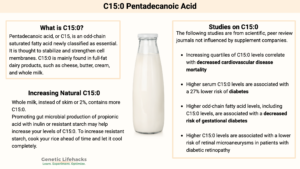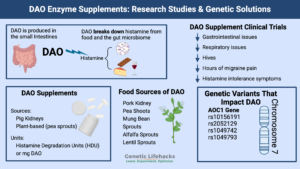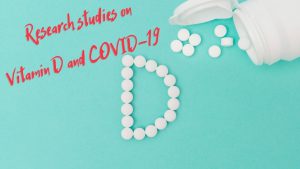Did you know that you can save a bunch of money on supplements just by dialing it in with personalized nutrition?
I’ve heard repeatedly from Genetic Lifehacks members that they have used their genetic data to dial in the essential vitamins – and jettison the unnecessary supplements.
Let me give you five quick examples of how you could use your genetic data to dial in the supplements worth trying and which ones to skip for now.
Dialing in your focus: which supplements are worthwhile?
If you’re anything like me, every time I read a great research study or just a good article about how a certain supplement is beneficial, I want to buy it… Next thing I know, I’m on Amazon reading reviews and deciding if the supplement is worth trying.
There’s a better way, though, than falling for marketing schemes for every supplement under the sun.
Cautionary note: Please keep in mind that genetics is just part of the picture regarding diet or micronutrients. Your variants can serve as a starting point for optimizing your nutrient intake, but it’s also important to keep your diet and lifestyle in mind.
Here are five examples to explain the concept:
1) Retinyl palmitate supplement vs. expensive carrot juicer
Vitamin A deficiency can show up as acne, keratosis pillars, dry eyes, or poor night vision. But is spending $300 on a juicer and a 25-pound bag of carrots really your best option? Or should you start eating grass-fed, organic beef liver twice a week? I’m always a proponent of getting my vitamins from foods… except when it comes to actually eating liver, which I’ve hated since childhood. So for me, the decision was whether a bottle of retinyl palmitate gel caps would be worth trying vs. drinking carrot juice (or taking beta carotene pills).
There are two forms of vitamin A: the beta-carotene form from plant foods (carrots) and the retinol form from animal foods. Your body has to convert the beta-carotene into the retinol form using the BCO1 enzyme.
Suppose you have multiple BCO1 variants (below). In that case, it may indicate that you would benefit from the retinyl palmitate form of vitamin A – especially if you have been relying on beta carotene as your source of vitamin A for a long time. Retinyl palmitate comes in relatively inexpensive gel caps. A quick Amazon check shows that Now brand retinyl palmitate is around $12 for 250 pills at 25,000IU. That may be more than you want to take every day, so you could space it out every other day, and the $12 bottle would last more than a year.
Cost savings: $300 fancy juicer vs. $12 for the year…
Your BCO1 variants (read full article here):
| Gene | RS ID | Effect Allele | Your Genotype | Notes About Effect Allele |
|---|---|---|---|---|
| BCO1 | rs7501331 | T | -- | Decreased beta-carotene conversion to active form of vitamin A |
| BCO1 | rs12934922 | T | -- | Decreased beta-carotene conversion to active form of vitamin A |
| BCO1 | rs11645428 | G | -- | GG only: lower beta-carotene conversion to active form of vitamin A |
| BCO1 | rs6420424 | A | -- | Decreased beta-carotene conversion to active form of vitamin A |
| BCO1 | rs6564851 | G | -- | Decreased beta-carotene conversion to active form of vitamin A |
2) Do we all need to take methyl folate?
Methyl folate is a well-known supplement that is frequently promoted online. But does everybody have to take it? For people without MTHFR variants, dietary folate and folic acid enriched foods may be just fine.
If you have MTHFR C677T variants, do you need to spend tons of money on high doses of methyl folate? If you get some folate in your diet, you may find that 400 mcg or even 200 mcg will be enough supplemental methyl folate. Jarrow is one brand that sells an inexpensive 400 mcg capsule. It is easy to pull apart and take just half of it (no real taste to it). The cost on Amazon is around $8 for 60 capsules, and if you are only taking half, it ends up being just a couple of dollars a month.
Cost savings: $0 if you don’t need to supplement or a couple of dollars a month for low doses.
Your MTHFR variants (read the full article here):
| Gene | RS ID | Effect Allele | Your Genotype | Notes About Effect Allele |
|---|---|---|---|---|
| MTHFR C677T | rs1801133 | A | -- | 40-70% decrease in MTHFR enzyme function (folate metabolism) |
| MTHFR A1298C | rs1801131 | G | -- | 10-20% decrease in MTHFR enzyme function (folate metabolism) |
3) Magnesium: Do you need the $30 a month magnesium supplement?
I don’t know how many articles I’ve read about magnesium stating that most people are deficient. Many articles explain that you need a specific type of magnesium (usually whatever they sell), and it is often the most expensive kind of magnesium.
Magnesium is a cofactor in many different cellular processes, and a deficiency in magnesium can cause various problems.
But what if you aren’t magnesium deficient? If you eat a diet full of leafy greens or get magnesium in your well water, you may not need to spend a bunch on expensive magnesium supplements.
Check your genetic data to see if you are more likely to need more magnesium than normal. And then track how much magnesium you are likely getting in your diet. Utilize an app like cronometer.com to see if you are hitting the RDA most days.
Cost savings: $30 a month if you don’t need the expensive magnesium
Your Magnesium variants (read the full article here):
| Gene | RS ID | Effect Allele | Your Genotype | Notes About Effect Allele |
|---|---|---|---|---|
| TRPM6 | rs3750425 | T | -- | lower serum magnesium levels |
| TRPM6 | rs2274924 | C | -- | lower serum magnesium levels |
| TRPM6 | rs121912625 | A | -- | rare mutation linked to hypomagnesia |
| TRPM7 | rs8042919 | A | -- | increased sensitivity to low magnesium levels, |
| CNNM2 | rs12413409 | A | -- | decreased risk of hypertension and heart disease (good!) |
| CNNM2 | rs11191548 | C | -- | decreased risk of hypertension (good!) |
| CNNM2 | rs7914558 | G | -- | GG only: decreased gray matter (on average) |
4) Supplement Stacks: Adding B12 to Lithium Orotate
Sometimes understanding how a supplement works can help you optimize the dose.
Many try supplemental lithium orotate to boost mood, but it doesn’t work for everyone. Understanding how lithium orotate works in conjunction with vitamin B12 may help.
Additionally, using the right type of vitamin B12 can cut through much trial and error.
So what is the ‘right type of B12’? For most people, methylcobalamin (methylB12) is a great option, and going with a sublingual supplement gets around any absorption issues in the stomach.
However, for people with slow COMT variants, going with hydroxyB12 or adenosylB12 can often prevent mood swings and irritability. You wouldn’t want to become irrationally angry due to your B-vitamins, right?
Cost savings: Your relationships with family and friends may be saved by lithium plus the most suitable B12…
Your COMT variants (read the full article here):
| Gene | RS ID | Effect Allele | Your Genotype | Notes About Effect Allele |
|---|---|---|---|---|
| COMT | rs4680 | A | -- | GG = higher activity; AG=Intermediate activity AA = lower activity |
| COMT | rs4633 | T | -- | CC = higher activity ; TT = lower COMT activity |
| COMT | rs6267 | T | -- | Minor decrease in COMT |
| COMT | rs165599 | A | -- | Minor decrease in COMT |
| COMT | rs165774 | A | -- | lower COMT activity; more likely to have irrational beliefs if subjected to maltreatment in childhood |
5) Getting rid of chronic diseases: Inflammation-related variants
Many chronic diseases have chronically elevated inflammatory cytokines as part of the root cause. For some, tamping down inflammation can help to resolve chronic diseases. It may alleviate the cost of prescription medications. (Check with your doctor before stopping any prescriptions.)
If you have a bunch of inflammation-related variants, you may want to try quercetin, curcumin, or luteolin (read through the articles to see which one you may find works best for you). If you decide to take any of these long term, they are available in bulk powdered form, which is usually less expensive.
Simple change: For quercetin or curcumin, taking the supplement with fat may help increase absorption, so you don’t have to take so much of the supplement.
Cost savings: Getting rid of a chronic disease can be priceless! But even just lessening the symptoms and reducing medications can save you a lot.
| Gene | RS ID | Effect Allele | Your Genotype | Notes About Effect Allele |
|---|---|---|---|---|
| TNF | rs1800629 | A | -- | Higher TNF levels, increased risk of many chronic inflammatory conditions |
| TNF | rs361525 | A | -- | Higher TNF levels, increased risk of many chronic inflammatory conditions |
| IL8 | rs4073 | A | -- | A/A: Increased IL8; increased risk of periodontitis, gastritis, Alzheimers, diabetic nephropathy |
| IL6 | rs1800795 | C | -- | C/C: lower risk of gingivitis |
| IL1B | rs16944 | G | -- | G - Typical risk of septic shock; A/A: Increased risk of septic shock |
| IL1B | rs1143634 | A | -- | Increased risk of gingivitis |
| IL1A | rs1800587 | A | -- | Increased IL1A, increased risk of gum disease, tinnitus, acne, hearing loss |
| IL10 | rs1800896 | C | -- | CC: higher IL-10 (usually good!) |
| NLRP3 | rs35829419 | A | -- | Increased susceptibility to several chronic inflammatory diseases. |
| HMGB1 | rs1045411 | T | -- | increased sepsis risk, higher HMGB1 levels in infection; |
| INFG | rs2430561 | A | -- | increased inflammatory and sickness behavior |
| MTHFR | rs1801133 | A | -- | Decreased methyl group production, decreased detoxification of mercury and arsenic, possibly decreased melatonin production |
| GSTM1 | rs366631 | A | -- | AA: GSTM1 null, increased risk of cancer, increased negative effects of smoking |
| GSTO1 | rs4925 | A | -- | Decreased detoxification of arsenic; increased risk of PCOS |
| GSTA1 | rs3957357 | A | -- | Decreased detoxification, increased risk of depression, |
| NFE2L2 | rs6721961 | T | -- | Decreased Nrf2, increased risk of male infertility, increased risk of CVD, |
| AS3MT | rs11191439 | C | -- | Arsenic is more harmful |
| NQO1 | rs1800566 | A | -- | Increased risk of cancer from benzene and smoking, increased risk of Parkinson’s from pesticide exposure |
| SOD1 | rs1041740 | T | -- | Increased ROS, increased risk of kidney problems, heart disease |
| SOD2 | rs5746136 | T | -- | Increased ROS, increased risk of asthma, PCOS |
Hey! Want to go further with your genetic raw data? Join as a Member!
General Cost Saving Ideas with Supplements:
Here are a few more suggestions for further lowering the cost of any supplements you decide to try.
Tracking:
If you have a whole drawer or shelf full of supplements, do you even remember why you’re taking each one? Keep track of why you’re taking a supplement and re-evaluate periodically if you still need it.
Supplements are just that — supplemental. If your diet or lifestyle has changed, you may not need the supplement as often or at all.
Write down what you’re taking and why you started taking it. Review your list every month or so — see if the reason you’re taking the supplement is still valid and whether the supplement is actually doing anything for you.
Here is a printable form to track genetic reasons for taking a supplement. Alternatively, you could simply use Excel or Google Sheets to set up a quick spreadsheet. Just write down what you are taking and why you are taking it. Revisit your reasons before rebuying the supplement.
Skipping the prepackaged capsules:
Buying bulk powdered supplements is often quite a bit cheaper per serving.
~ Bulk Supplements is one brand offering many types of powdered supplements. It is sold on Amazon or its website.
~ PureBulk is another option, and it is often a little cheaper on its website than on Amazon.
If you’re dealing with powdered supplements, you’ll want to invest in a small digital scale to know how much you’re taking.
- For supplements that don’t taste terrible, you can simply add the powder to a smoothie, yogurt, etc.
- For supplements that taste terrible, a capsule maker plus empty capsules can be cheaper and easier in the long run.
For me, the significant advantage of buying powdered supplements is that I don’t consume a bunch of fillers or excipients found in most prepackaged capsules (cellulose gums, magnesium stearate, colorings, etc.).
I would suggest making sure you’re planning on taking the supplement for a long time before buying in larger quantities. You don’t want to get stuck with a bunch of bags of powdered supplements that you’ll never finish taking.
DIY vitamin water:
Powdered supplements, such as vitamin C or zinc, can easily be added to a drink to give a small vitamin or mineral boost to a drink. Just be sure to measure it out before adding it to your drink — too much vitamin C will leave you running for the bathroom, and too much zinc gives some people a stomach ache.
Skipping days (pulsing supplements):
Do you really need to take a supplement every day? If you are getting some of the vitamins/nutrients in your foods, perhaps you only need to supplement on days when you eat poorly. Pulsing supplements may better mimic how you naturally get higher doses of micronutrients in different foods.
Here are a few examples:
- I skip vitamin D supplements in the summer because I get sun exposure each day.
- For fat-soluble vitamins, perhaps you can take a higher dose a couple of days a week.
- For an antioxidant supplement, maybe you could skip it on days when you’re eating the acai bowl, drinking pomegranate juice, and having a huge salad for dinner.
Obviously, if you are under the care of a health care practitioner, check with them before making changes to your supplements…
Real Research on Natural Supplements:
How can you know whether a supplement is actually effective for people – versus just being hyped by marketers?
Read the research studies and clinical trials to see if the benefits are real and applicable to you. Get a jump start by reading my summary of the research studies.
Check out all of these Genetic Lifehacks articles on Supplement Research:



























